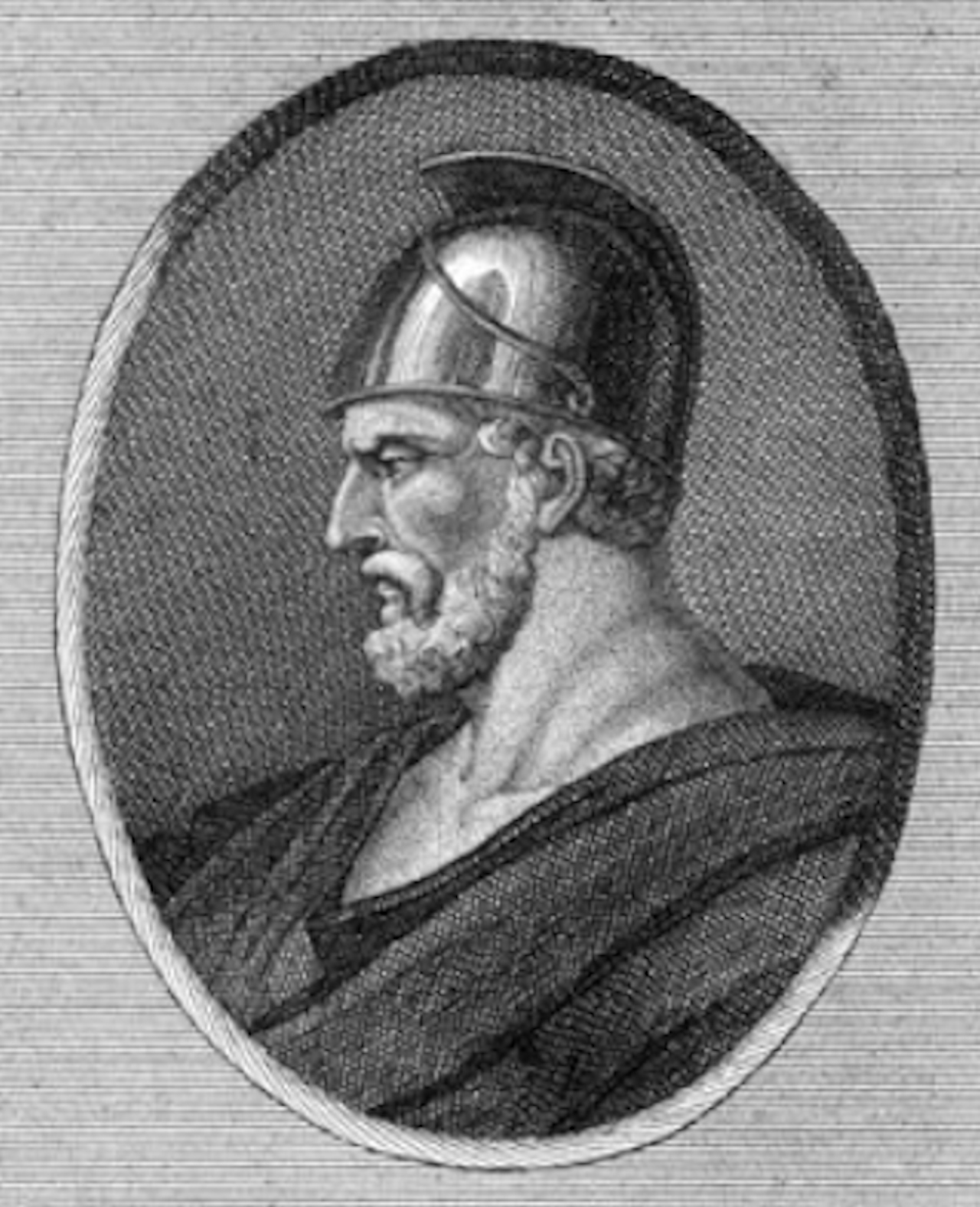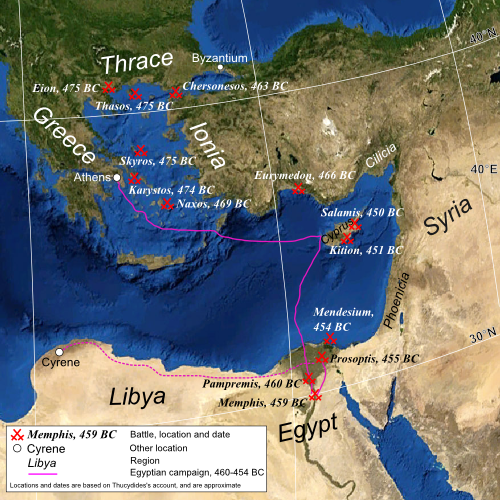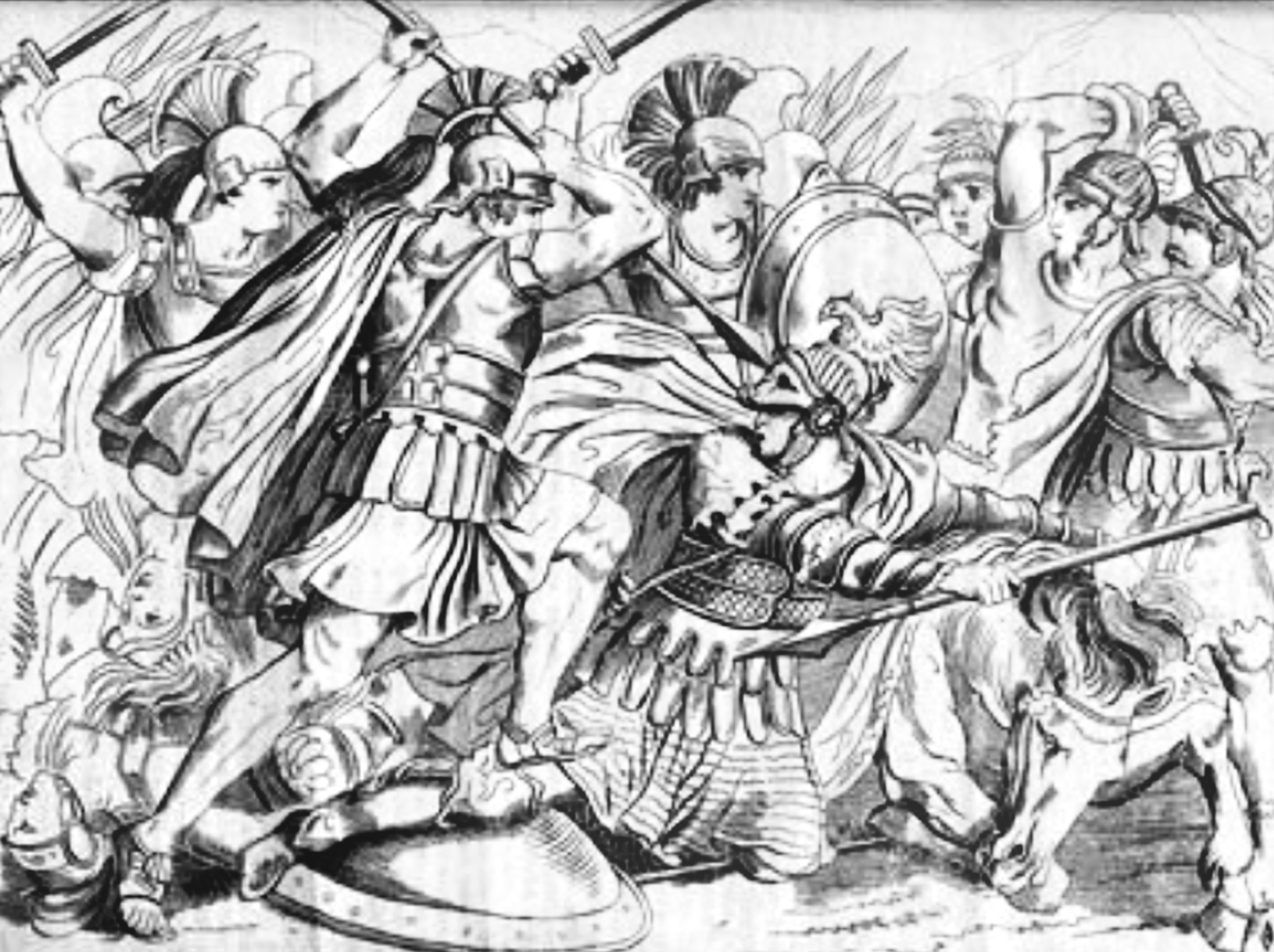|
Battle Of Plataea
The Battle of Plataea was the final land battle during the second Persian invasion of Greece. It took place in 479BC near the city of Plataea in Boeotia, and was fought between an alliance of the Polis, Greek city-states (including Sparta, Classical Athens, Athens, Corinth and Megara), and the Achaemenid Empire of Xerxes I (allied with Greek states including Boeotia, Thessalia, and Macedonia (ancient kingdom), Macedon). At the preceding Battle of Salamis, the allied Greek navy had won an unlikely but decisive victory, preventing the conquest of the Peloponnesus region. Xerxes then retreated with much of his army, leaving his general Mardonius (nephew of Darius I), Mardonius to finish off the Greeks the following year. In the summer of 479BC, the Greeks assembled a huge army and marched out of the Peloponnesus. The Persians retreated to Boeotia and built a fortified camp near Plataea. The Greeks, however, refused to be drawn into the prime terrain for cavalry around the Persian ... [...More Info...] [...Related Items...] OR: [Wikipedia] [Google] [Baidu] |
Second Persian Invasion Of Greece
The second Persian invasion of Greece (480–479 BC) occurred during the Greco-Persian Wars, as King Xerxes I of Persia sought to conquer all of Greece. The invasion was a direct, if delayed, response to the defeat of the first Persian invasion of Greece (492–490 BC) at the Battle of Marathon, which ended Darius I's attempts to subjugate Greece. After Darius's death, his son Xerxes spent several years planning for the second invasion, mustering an enormous army and navy. The Athenians and Spartans led the Greek resistance. About a tenth of the Greek city-states joined the 'Allied' effort; most remained neutral or submitted to Xerxes. The invasion began in spring 480 BC, when the Persian army crossed the Hellespont and marched through Thrace and Macedon to Thessaly. The Persian advance was blocked at the pass of Thermopylae by a small Allied force under King Leonidas I of Sparta; simultaneously, the Persian fleet was blocked by an Allied fleet at the straits of Artemisium ... [...More Info...] [...Related Items...] OR: [Wikipedia] [Google] [Baidu] |
Aristodemus (died 479 BC)
Aristodemus (, died 479 BC) was a Spartan soldier who was one of the 300 Spartans sent to the Battle of Thermopylae. Thermopylae Aristodemus was the only Spartan survivor, as he was not present at the last stand. Aristodemus and another soldier, Eurytus, were stricken with a disease of the eye, causing King Leonidas to order them to return home before the battle, but Eurytus turned back, though blind, and met his end charging into the fray.Herodotus, 7.229.Schmitz vol 1. p. 304. The Greek historian Herodotus believed that had both Aristodemus and Eurytus returned alive, or had Aristodemus alone been ill and excused from combat, the Spartans would have ascribed no blame to Aristodemus. However, because Eurytus did turn back and died in combat, Aristodemus was regarded as a coward and subjected to humiliation and disgrace at the hands of his compatriots; in the words of Herodotus, "no man would give him a light for his fire or speak to him; he was called Aristodemus the Coward." Th ... [...More Info...] [...Related Items...] OR: [Wikipedia] [Google] [Baidu] |
Peloponnesus
The Peloponnese ( ), Peloponnesus ( ; , ) or Morea (; ) is a peninsula and geographic regions of Greece, geographic region in Southern Greece, and the southernmost region of the Balkans. It is connected to the central part of the country by the Isthmus of Corinth land bridge which separates the Gulf of Corinth from the Saronic Gulf. From the late Middle Ages until the 19th century, the peninsula was known as the Morea, a name still in colloquial use in its demotic Greek, demotic form. The peninsula is divided among three administrative regions of Greece, administrative regions: most belongs to the Peloponnese (region), Peloponnese region, with smaller parts belonging to the West Greece and Attica (region), Attica regions. Geography The Peloponnese is a peninsula located at the southern tip of the mainland, in area, and constitutes the southernmost part of mainland Greece. It is connected to the mainland by the Isthmus of Corinth, where the Corinth Canal was constructed in 18 ... [...More Info...] [...Related Items...] OR: [Wikipedia] [Google] [Baidu] |
Battle Of Salamis
The Battle of Salamis ( ) was a naval battle fought in 480 BC, between an alliance of Greek city-states under Themistocles, and the Achaemenid Empire under King Xerxes. It resulted in a victory for the outnumbered Greeks. The battle was fought in the straits between the mainland and Salamis, an island in the Saronic Gulf near Athens, and marked the high point of the second Persian invasion of Greece. It was arguably the largest naval battle of the ancient world, and marked a turning point in the invasion. To block the Persian advance, a small force of Greeks blocked the pass of Thermopylae, while an Athenian-dominated allied navy engaged the Persian fleet in the nearby straits of Artemisium. In the resulting Battle of Thermopylae, the rearguard of the Greek force was annihilated, while in the Battle of Artemisium the Greeks suffered heavy losses and retreated after the loss at Thermopylae. This allowed the Persians to conquer Phocis, Boeotia, Attica and Euboea. The allies ... [...More Info...] [...Related Items...] OR: [Wikipedia] [Google] [Baidu] |
Xerxes I
Xerxes I ( – August 465 BC), commonly known as Xerxes the Great, was a List of monarchs of Persia, Persian ruler who served as the fourth King of Kings of the Achaemenid Empire, reigning from 486 BC until his assassination in 465 BC. He was the son of Darius the Great and Atossa, a daughter of Cyrus the Great. In Western history, Xerxes is best known for his Second Persian invasion of Greece, invasion of Greece in 480 BC, which ended in Persian defeat. Xerxes was designated successor by Darius over his elder brother Artobazan and inherited a large, multi-ethnic empire upon his father's death. He consolidated his power by crushing revolts in Twenty-seventh Dynasty of Egypt, Egypt and Babylonian revolts (484 BC), Babylon, and renewed his father's campaign to subjugate Ancient Greece, Greece and punish Classical Athens, Athens and its allies for their interference in the Ionian Revolt. In 480 BC, Xerxes personally led a large army and crossed the Dardanelles, Hellespont into Eu ... [...More Info...] [...Related Items...] OR: [Wikipedia] [Google] [Baidu] |
Second Persian Invasion Of Greece
The second Persian invasion of Greece (480–479 BC) occurred during the Greco-Persian Wars, as King Xerxes I of Persia sought to conquer all of Greece. The invasion was a direct, if delayed, response to the defeat of the first Persian invasion of Greece (492–490 BC) at the Battle of Marathon, which ended Darius I's attempts to subjugate Greece. After Darius's death, his son Xerxes spent several years planning for the second invasion, mustering an enormous army and navy. The Athenians and Spartans led the Greek resistance. About a tenth of the Greek city-states joined the 'Allied' effort; most remained neutral or submitted to Xerxes. The invasion began in spring 480 BC, when the Persian army crossed the Hellespont and marched through Thrace and Macedon to Thessaly. The Persian advance was blocked at the pass of Thermopylae by a small Allied force under King Leonidas I of Sparta; simultaneously, the Persian fleet was blocked by an Allied fleet at the straits of Artemisium ... [...More Info...] [...Related Items...] OR: [Wikipedia] [Google] [Baidu] |
Artabazos I Of Phrygia
Artabazos (; 480 BC - 455 BC) was a Persian people, Persian general in the army of Xerxes I, and later satrap of Hellespontine Phrygia (now northwest Turkey) under the Achaemenid dynasty, founder of the Pharnacid dynasty of satraps. He was the son of Pharnaces (son of Arsames), Pharnaces, who was the younger brother of Hystaspes (father of Darius I), Hystaspes, father of Darius I. Artabazos was therefore a first cousin of the great Achaemenid ruler Darius I. General in the Second Persian invasion of Greece Artabazus was one of the generals of Xerxes I, Xerxes in the 480 BC Second Persian invasion of Greece, in command of the Parthians and the Chorasmians in the Achaemenid army. He was particularly in charge of the reserve forces guarding the route back to Asia, and responsible for suppressing a revolt in Potidaea. The invasion ended the following year with the commander-in-chief Mardonius (general), Mardonius, ignoring advice from Artabazus and others, meeting the Gree ... [...More Info...] [...Related Items...] OR: [Wikipedia] [Google] [Baidu] |
Masistius
Masistius (Μασίστιος to the Greeks) was a Persian cavalry commander best known for his role in the second Persian invasion of Greece. Biography Masistius was the son of a man named Siromitras. He was reportedly a very tall and handsome man. He became a distinguished officer in the Persian army during Xerxes's invasion of Greece and gained great popularity among the troops. He died shortly before the Battle of Plataea, placing his death at some time during 479 BC. His death was keenly felt by the Persians. He was related to Mardonius, son in law of king Xerxes. Role in the Second Persian Invasion Masistius is first mentioned as the commander of the Saspirian and Alarodian contingents of Xerxes's army which had been gathered for the second invasion of Greece. Masistius would have been appointed to this position by the senior commanders of the Persian army. It would have been Masistius's responsibility to appoint officers to command the squads into which the Saspirian and A ... [...More Info...] [...Related Items...] OR: [Wikipedia] [Google] [Baidu] |
Hegesistratus
Hegesistratus () is an ancient Greek name. Some people with this name were: # A Greek diviner for Mardonius during the Greco-Persian Wars. Originally an Elean, he had been captured by the Spartans and put in bonds. He escaped by cutting off a piece of his own foot and replaced it with a wooden one; however, he was captured again at Zacynthus and put to death. This story is mentioned in the ninth book (chapter 37) of the '' Histories'' written by Herodotus. # An emissary from Samos to the Greeks before the Battle of Mycale.Hegesistratus ''Perseus Encyclopedia''. # A despot of . # An |
Mardonius (nephew Of Darius I)
Mardonius ( ; ; died 479 BC) was a Persian military commander during the Greco-Persian Wars. Though he secured initial victories in the first Persian invasion of Greece, he was ultimately forced to retreat into Anatolia after suffering catastrophic losses in both men and material due to a storm off the coast of Mount Athos, following which he was relieved of his command by Darius the Great. He was later re-appointed by Xerxes I and took part in the second Persian invasion of Greece. In 480 and 479 BC, Mardonius spearheaded the Persian army's destruction of Athens. Shortly thereafter, he was killed during the Battle of Plataea. Early and personal life Mardonius was the son of Gobryas, a Persian nobleman who had assisted the Achaemenid prince Darius when he claimed the throne. The alliance between the new king and his friend was cemented by diplomatic marriages: Darius married Gobryas' daughter, and Gobryas married Darius' sister. Furthermore, Mardonius married Darius' daughter ... [...More Info...] [...Related Items...] OR: [Wikipedia] [Google] [Baidu] |
Olympiodorus (military Leader)
Portrait of Olympiodoros in bronze dated to 280 B.C. Oslo National Museum item no. 1292., alt=Color photograph of the front of a bronze bust of a man, with the Greek letters for Olympiodors at the base. Olympiodoros () was a military leader (General) in Athens in ancient Greece. His capacity as a savior of Athens and his self-confident power and serious engagement during political crises were emphasized. He was elected Strategos. He took part in the established Athenian coalition government with Philippides of Paiania. He commanded a body of three hundred picked men at the Battle of Plataea, who were engaged in a service from which all the other Greeks shrank. He was an Athenian general who, when Athens was attacked by Cassander, compelled the latter to withdraw his forces. He subsequently rid the city of the Macedonian garrison Demetrius Demetrius is the Latinization of names, Latinized form of the Ancient Greek male name, male Greek given names, given name ''Dēmḗtrios'' ( ... [...More Info...] [...Related Items...] OR: [Wikipedia] [Google] [Baidu] |
Aristides
Aristides ( ; , ; 530–468 BC) was an ancient Athenian statesman. Nicknamed "the Just" (δίκαιος, ''díkaios''), he flourished at the beginning of Athens' Classical period and is remembered for his generalship in the Persian War. The ancient historian Herodotus cited him as "the best and most honourable man in Athens", and he received similarly reverent treatment in Plato's Socratic dialogues. Biography Aristides was a member of a family of moderate fortune; his father's name was Lysimachus. Early in life he became a follower of the statesman Cleisthenes. He probably first came to notice as '' strategos'' in command of his native tribe Antiochis at the Battle of Marathon of 490 BC. In consequence of the distinction which he then achieved he is said to have won the election as ''archon eponymos'' for the ensuing year (489488). Pursuing a conservative policy to maintain Athens as a land power, he was one of the chief opponents of the naval policy proposed by ... [...More Info...] [...Related Items...] OR: [Wikipedia] [Google] [Baidu] |








